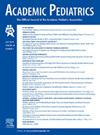创伤知情护理沟通技能评估工具的开发与验证。
IF 3
3区 医学
Q1 PEDIATRICS
引用次数: 0
摘要
背景:随着医疗保健系统认识到创伤对健康结果的影响,创伤知情护理(TIC)在医学教育中不断发展。TIC 承认并应对创伤对身体、心理和情感健康的影响。随着 TIC 培训的开发和向医疗保健专业人员提供跨学习者连续性的培训,课程需要评估的不仅仅是学习者的满意度和知识,还需要更好地评估技能的变化。我们开发了用于创伤知情护理的差距卡拉马祖沟通技能评估表(GKCSAF-TIC),用于评估儿科受训人员在创伤知情护理中的沟通技能:描述 GKCSAF-TIC 在评估儿科住院医师在与标准化病人接触时的 TIC 技能方面的发展和有效性证据:我们在一项为期一年的儿科住院医师前瞻性队列研究中开发并实施了TIC沟通技能评估工具。我们在 TIC 培训前后进行了模拟患者接触,每次接触都由两名儿科主治医师进行评估。我们采用梅西克的框架收集有效性证据,重点关注内容、反应过程、内部结构以及与其他变量的关系:我们分析了 33 名儿科实习生的 57 次标准化病人会诊,其中包括 23 对前后配对。开发过程和评分者培训支持内容和反应过程的有效性。用克朗巴赫α衡量的内部一致性为 0.93 至 0.96,而用类内相关性衡量的评分者间可靠性为 0.80 至 0.83。从培训前到培训后,评分有了明显的提高(3.7/5 到 4.05/5;P < 0.05):GKCSAF-TIC显示出很强的初步有效性,为教育者提供了一种评估儿科学员TIC并为其提供形成性反馈的重要方法。新内容儿科受训人员正在学习创伤知情护理,他们在临床环境中的创伤知情护理实践需要形成性反馈。GKCSAF-TIC 可用于评估受训人员在提供创伤知情护理时的沟通技巧,并为其提供形成性反馈。本文章由计算机程序翻译,如有差异,请以英文原文为准。
Development and Validation of a Trauma-Informed Care Communication Skills Assessment Tool
Background
Trauma-informed care (TIC) is growing in medical education as health care systems recognize trauma’s impact on health outcomes. TIC acknowledges and responds to the effects of trauma on physical, psychological, and emotional health. As TIC trainings are developed and delivered to health care professionals across the learner continuum, curricula need evaluation beyond learner satisfaction and knowledge to better assess changes in skills. We developed the Gap Kalamazoo Communication Skills Assessment Form for Trauma-Informed Care (GKCSAF-TIC) to evaluate pediatric trainees' communication skills in TIC. We describe the development and validity evidence of the GKCSAF-TIC in assessing pediatric residents' TIC skills during standardized patient encounters.
Methods
We developed and implemented the TIC communication skills assessment tool in a one-year prospective cohort study involving pediatric residents. We conducted simulated patient encounters conducted before and after TIC training, with two pediatric faculty attendings assessing each encounter. We gathered validity evidence using Messick’s framework, focusing on content, response process, internal structure, and relationship with other variables.
Results
We analyzed 57 standardized patient encounters with 33 pediatric interns, including 23 pre-post matched pairs. The development process and rater training supported content and response process validity. Internal consistency, measured by Cronbach’s alpha, ranged from 0.93 to 0.96, while inter-rater reliability, measured by intraclass correlations, ranged from 0.80 to 0.83. There was a significant improvement in scores from pre-training to post-training (3.7/5 to 4.05/5; P < 0.05).
Conclusion
The GKCSAF-TIC demonstrated strong preliminary validity and offers educators a valuable means to assess and provide formative feedback to pediatric trainees about TIC.
求助全文
通过发布文献求助,成功后即可免费获取论文全文。
去求助
来源期刊

Academic Pediatrics
PEDIATRICS-
CiteScore
4.60
自引率
12.90%
发文量
300
审稿时长
60 days
期刊介绍:
Academic Pediatrics, the official journal of the Academic Pediatric Association, is a peer-reviewed publication whose purpose is to strengthen the research and educational base of academic general pediatrics. The journal provides leadership in pediatric education, research, patient care and advocacy. Content areas include pediatric education, emergency medicine, injury, abuse, behavioral pediatrics, holistic medicine, child health services and health policy,and the environment. The journal provides an active forum for the presentation of pediatric educational research in diverse settings, involving medical students, residents, fellows, and practicing professionals. The journal also emphasizes important research relating to the quality of child health care, health care policy, and the organization of child health services. It also includes systematic reviews of primary care interventions and important methodologic papers to aid research in child health and education.
 求助内容:
求助内容: 应助结果提醒方式:
应助结果提醒方式:


